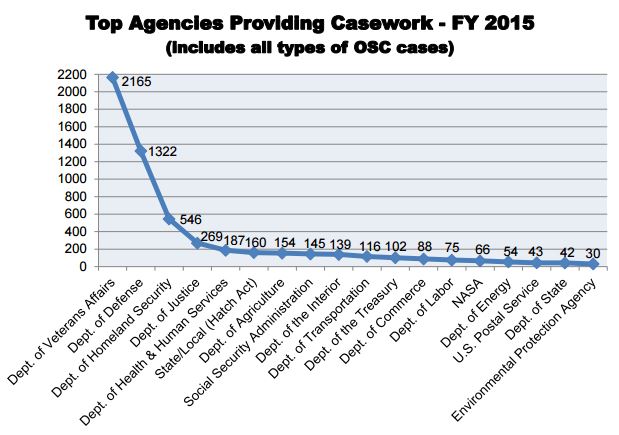OSC whistleblower cases hit record highs in 2015
More federal employees turned to the Office of Special Counsel with prohibited personnel practice or whistleblower complaints in 2015, and the agency resolved more...
The Office of Special Counsel was busy in 2015 — far busier than any year in its history — receiving and processing more prohibited personnel practice complaints and whistleblower disclosures from federal employees than the year before.
“While OSC has one of the smallest budgets of any federal law enforcement agency with governmentwide jurisdiction, the demands on our agency have never been greater,” Carolyn Lerner, OSC Special Counsel, wrote in her agency’s annual report to Congress. “With Congress’ continued support, OSC will be able to keep pace with its rising caseload and continue to promote better and more accountable government.”
OSC received 6,140 new matters in fiscal 2015, well above 2014’s total of 5,236 cases. Of the agency’s new 2015 matters, 66 percent of them were prohibited personnel practice (PPP) cases. OSC issued 277 favorable actions for 212 federal employees who filed PPP complaints in 2015, a 59 percent increase over the 174 actions it issued for 142 employees the year before.
The majority of those PPP complaints involved whistleblower reprisals, the agency said. OSC delivered 233 favorable actions for 175 employees who filed whistleblower reprisal complaints in 2015, a 69 percent bump from the 138 actions it issued in 2014.
In addition, OSC sent more reports of whistleblower disclosures to Congress and the President between 2014 and 2015 — a 177 percent increase.
And 19 federal employees received disciplinary action after OSC investigated and confirmed their involvement in retaliating against whistleblowers in 2015.
Federal employment attorney John Mahoney said the latest OSC report showed that more people felt more comfortable to report prohibited personnel practices, not that there was more misconduct or wrongdoing at their agencies.
Debra D’Agostino, a federal employment attorney with the Federal Practice Group, agreed. She said the intentions of the Whistleblower Protection Enhancement Act are making an impact on federal employees. And the Office of Special Counsel, which she and her colleagues once called “a black hole” for complaints, is beginning to show that it can process claims more quickly and is issuing more favorable results for federal employees.
“Whistleblowing is one of those things that is more comfortable if you’re not alone,” she said. “At the VA, for example, people saw OSC responding appropriately, and they felt more comfortable coming out themselves. Now that people are seeing that OSC is responding meaningfully to their complaints, people are more willing to stick out their neck to blow the whistle.”
Once again, the most cases came from the Veterans Affairs Department. OSC received 2,165 prohibited personnel, whistleblower and USERRA cases from the VA — roughly 800 more cases than the agency with the next highest total, the Defense Department.

Based on OSC’s work over the past two years, VA disciplined or elected to discipline 40 employees who retaliated against whistleblowers or participated in some kind of misconduct that posed a risk to veterans, the agency said.
OSC’s record number of cases in 2015 continues a trend that the agency has experienced since 2011, and both D’Agostino and Mahoney said they expect that trend will only go upward over the next few years.
“Whistleblowers are popular at the moment, and hopefully that will continue to be the case,” Mahoney said.
The agency has also been busy receiving and resolving complaints related to the Hatch Act, the legislation that gives OSC the authority to investigate and resolve cases where federal employees are involved in some kind of unlawful political activity.
OSC received 1,023 requests for Hatch Act opinions, fewer than the 1,382 and 1,767 opinions it issued in 2014 and 2013, respectively.
“As our track record demonstrates, a relatively small investment in OSC pays huge dividends in curbing waste, fraud and abuse,” Lerner said, adding that OSC’s budget is one of the smallest of any federal law enforcement agency with governmentwide jurisdiction.
The agency employed 129 full time staff members in 2015, the OSC report said.
But Congress should see this report as an incentive to give OSC more funding in the future, so the agency can hire more people to process prohibited practice and whistleblower cases, Mahoney said.
“Congress sees a huge benefit in [whistleblowers],” he said. “They view whistleblowers as their eyes and ears to what’s going on at the agencies.”
Though some in the legal community see OSC’s latest numbers as a huge turnaround for the agency, OSC employees are still overburdened with casework.
“I have complaints there now that have been there for two-plus years, and because my clients have faith in [its] process, because [it has] been doing good work, my clients are willing to stick with them,” D’Agostino said.
The House recently reauthorized OSC for another five years, after eight years without an official authorization. The legislation also improves OSC’s access to the agency documents it needs to complete a whistleblower investigation and gives OSC more time to review a specific case. The Thoroughly Investigating Retaliation Against Whistleblowers Act now sits with the Senate.
Copyright © 2025 Federal News Network. All rights reserved. This website is not intended for users located within the European Economic Area.
Nicole Ogrysko is a reporter for Federal News Network focusing on the federal workforce and federal pay and benefits.
Follow @nogryskoWFED





